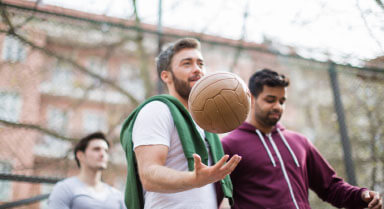- Get a good night's sleep
According to a Harvard study1, sleep deprivation can result in 11.3 days' worth of lost productivity, so being well-rested for the day ahead is essential. And it's not just about having an early bedtime; what you do in the early evening will also impact on your slumber. Avoid exercise three to four hours before sleep, along with alcohol and caffeine. Keeping erratic hours will work against you; instead, set a regular bedtime that your body can get used to. A final tip: lower the temperature in your bedroom - a UK study by Eve Sleep suggested 50% of people had problems sleeping due to overly hot bedrooms2. - Fuel your day the right way
A substantial, well-considered breakfast will see you through to lunchtime, especially if you include energy-packed protein and fruits. At lunch, avoid tempting 'fast food' options that are full of starchy foods like pasta and bread; they'll fill you up but cause fatigue in the afternoon as your body attempts to digest your heavy lunch. - Don't get tied to your desk
When you take a lunch break, you'll return to work feeling more creative, productive and awake. And step away from your workstation every now and again - even taking a few minutes to stretch, stop by a colleague's desk for a quick catch-up, or drink some water will give you a mental boost. - Drink plenty of water
Most of us don't drink the recommended six to eight glasses of water a day, but dehydration can lead to drowsiness and sluggishness. Depending on your level of physical activity and the climate in your region, you may need to consume more. - Maintain good posture
If you sit at a desk for most of your work, you're probably stretching your neck forward or tilting your head slightly upwards for long periods of time. This posture puts a strain on the neck, shoulders, spine and back and can cause tight muscles, stiffness and pain, along with headaches. To limit neck and back strain, think about your posture and consider an adjustable work station to make sure your screen is at the most appropriate height for you. Try raising your desk or standing at your work station and use a headset or speaker phone when possible to avoid neck and head postures associated with holding a phone next to your ear. - Limit caffeine intake
Most people drink caffeinated beverages to boost energy, but the stimulant effect doesn't last for long; within two hours, most people will begin to feel their energy level drop and fatigue set in. And too much caffeine, especially later at night may disrupt sleep patterns, making the next day difficult. If you can, limit yourself to one cup in the morning and one cup early afternoon. - Smile
We know that smiling at others makes them feel better, but a smile also stimulates hormones in your brain which, in turn, improves your mood too. When it comes to a happier, healthier and more productive workplace, smiling is a win-win.
The information on this page is for educational purposes only and is not medical advice. Always consult your doctor for appropriate examinations, treatment, testing and care recommendations, including prior to starting a new diet or exercise program.
References
- Insomnia and the performance of US workers: results from the America insomnia survey, Kessler RC1, Berglund PA, Coulouvrat C, Hajak G, Roth T, Shahly V, Shillington AC, Stephenson JJ, Walsh JK, https://www.ncbi.nlm.nih.gov/pubmed/21886353, accessed February 2018
- Want the recipe for a perfect night's sleep?, http://blog.evemattress.co.uk/, accessed February 2018
- Six to eight glasses of water still best, https://www.nhs.uk/news/food-and-diet/six-to-eight-glasses-of-water-still-best, accessed February 2018
- Why faking a smile is a good thing, Roger Dooley, https://www.forbes.com/sites/rogerdooley/2013/02/26/fake-smile/#e86ab1e36765, accessed February 2018













